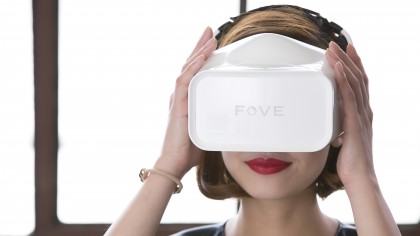Fove's eye-tracking headset solves one of VR's biggest headaches, hits Kickstarter

Last year we reported that Fove, the world's first reality headset to also feature eye-tracking technology, had been accepted into Microsoft's Ventures Programme - with possible interest from Microsoft in using the tech for its own VR efforts.
Then HoloLens happened and Fove remained very much its own thing. Today, Fove is taking the next step forward with a Kickstarter campaign that will (hopefully) bring the headset to market.
FOVE combines a 2560x1440 VR display with eye-tracking and motion-tracking technology. That eye-tracking tech can be used in several ways, and isn't something you'll find in other headsets right now. One demo we tried let us shoot enemies with lasers blasting from our eyes in whatever direction we were looking. It was cool - probably the closest we'll ever come to being Cyclops - but little more than a gimmick to show off the accuracy of the eye-tracking tech.
The next demo, which put us face to face with an enemy soldier, was much more impressive. Nothing seemed unusual at first, but by focusing our eyes on an object in the distance the focal point changed, blurring anything closer up and aping the function of the real human eye. Shifting our gaze back to the soldier in front of us put him back in focus.

Saturday Night Fove-r
Even without the eye tracking, it's still a decent HMD in its own right. "At the least it will be a fully functional HMD headset with additional features," said Fove CEO Yuka Kojima. The Fove actually has more pixels than the Vive, but doesn't yet have a good OLED screen so it's running an LCD at 60hz, while HTC's runs OLEDs at 90hz. As for input controls, Kojima says that the team is still in the process of deciding what to use: "Everyone else is fighting about it, and there's a lot of solutions out there, so we need to pick the best one"
"What we're aiming to do is support as much of the existing content as possible," he told us. "And from there we'll have developers adding eye-tracking as they like. I don't think it's reasonable to suddenly expect everyone to add eye-tracking."
The inability to focus on current headsets presents a barrier to better immersion right now, and though Fove still has work to do, it's close to solving that problem.
Sign up for breaking news, reviews, opinion, top tech deals, and more.
Kojima told us that they're aiming at the $400-500 price range for the headset when it hits the market, which the team expect to be in around a years time. That's a little bit more than Oculus, but then there's a little bit more tech inside. However if you want to put your name on the list now, it'll cost $349 (around £225/AU$440).
Ultimately, Microsoft went its own way with HoloLens and didn't use any of Fove's technology, but Kojima believes that might be at its expense: "Microsoft has decided it seems to push AR more than VR, which is kind of cool, it's kind of differentiating for them, but I think VR is going to mature quicker than AR and they're shot themselves in the foot slightly in the short term. In the long-term it's a good investment, but I think having only an AR solution is a bit of a mistake."
Fove's Kickstarter is now live here.

Hugh Langley is the ex-News Editor of TechRadar. He had written for many magazines and websites including Business Insider, The Telegraph, IGN, Gizmodo, Entrepreneur Magazine, WIRED (UK), TrustedReviews, Business Insider Australia, Business Insider India, Business Insider Singapore, Wareable, The Ambient and more.
Hugh is now a correspondent at Business Insider covering Google and Alphabet, and has the unfortunate distinction of accidentally linking the TechRadar homepage to a rival publication.